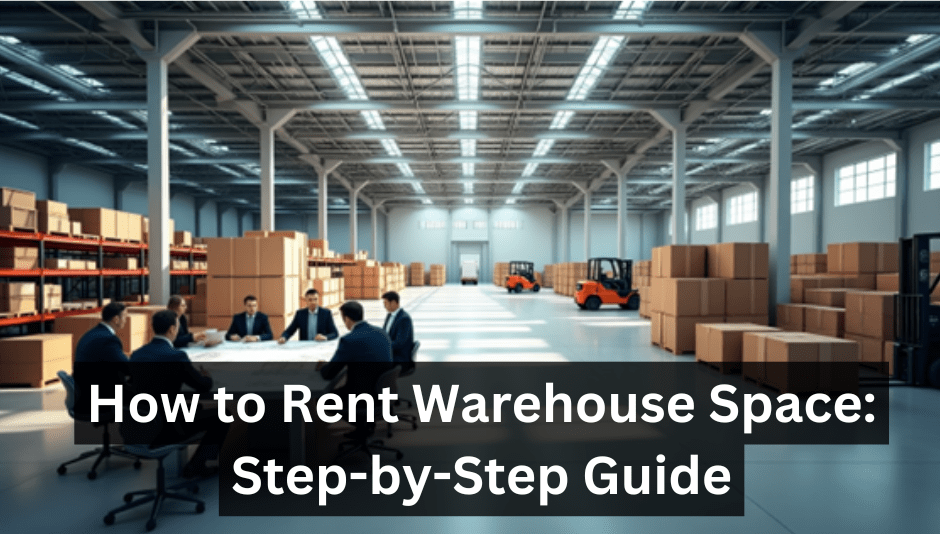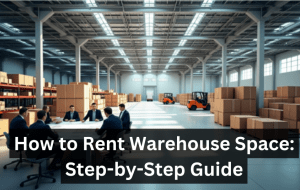
How to Rent Warehouse Space: A Step-by-Step Guide
Published At: Mon, 11/04/2024 - 11:48
The right warehouse space for your business can streamline processes and boost your profits. Your success in renting warehouse space depends on smart planning and a review of key factors. This applies whether you want to grow your current operations or launch something new.
This piece guides you through everything necessary to secure the perfect warehouse space. You'll discover ways to calculate your space requirements, do proper market research, review potential locations, and complete necessary checks. The step-by-step process helps you understand lease terms and assess loading dock details to find the ideal industrial space that matches your business needs.
Define Your Warehouse Space Needs
The accurate determination of your warehouse space requirements is significant before you search for industrial space to lease. Your current and projected inventory levels need careful analysis to select a space that accommodates your business's future expansion.
Calculate required square footage
The calculation of required square footage starts with your inventory's cubic footage needs. You can determine this by multiplying the number of pallets by their base dimensions and factoring in your maximum stack height. The warehouse utilization rate should stay between 22% to 27% of total space that allows proper space for aisles, staging areas and operations. Note that peak capacity numbers and safety stock requirements need consideration in these calculations.
Identify everything in (loading docks, ceiling height, etc.)
A modern warehouse just needs specific features to run optimally:
-
Clear height requirements: Modern facilities now provide 36-foot clear heights instead of the standard 32-foot clearance. This change increases storage capacity by up to 25% within the same footprint
-
Loading dock specifications and truck clearance
-
Reinforced flooring (7-8 inches recommended for higher clearances)
-
Energy-efficient lighting systems
-
Fire prevention systems
-
Adequate parking space
-
Power supply capacity
Determine office space requirements
Your warehouse facility needs adequate office space for administrative functions. You should consider setting aside a warehouse section for office operations with all required utilities and amenities. The space must accommodate employee facilities like restrooms and break areas. A well-positioned office area helps maintain quick oversight of warehouse operations and creates a professional environment for administrative tasks.
The total space calculation must include both storage and non-storage areas. To get an accurate picture of available storage space, subtract the square footage needed for offices, bathrooms, loading zones, and administrative areas from your total requirements.
Conduct a Comprehensive Market Search
Once you define your warehouse space requirements, start your market search through multiple channels to lease the perfect industrial space. A detailed search strategy will help you spot the best opportunities within your budget.
Employ online listing platforms
Major commercial real estate platforms that specialize in industrial and warehouse listings are the best place to start. LoopNet, the largest database, provides over 500,000 listings and 6.3 billion square feet of leasable space. These platforms will help you:
-
MyPerfectWorkplace lists industrial, warehouse, office space, and coworking spaces
-
CREXi manages transactions and helps find properties
-
CommercialCafe lists industrial and warehouse spaces
-
Catylist specializes in industrial property searches
-
Biproxi gives listing access without subscriptions
Involve commercial real estate agents
A qualified commercial real estate broker can substantially speed up your search process. Your broker will explain:
-
Current market conditions and trends
-
Property availability and upcoming developments
-
Fair market values and rental rates
-
Landlord reputations and negotiation strategies
A skilled broker helps you understand market information and finds properties that arrange with your needs and budget.
Different warehouse classes (A, B, C) explained
Your operational needs and budget will determine which warehouse classification works best. Class A warehouses are modern buildings less than 15 years old that come with premium amenities and higher rents. Class B facilities range between 15-20 years old and provide functional space at standard market rates without luxury features. Class C properties are the most affordable option, typically over 20 years old and situated in less prime locations. These might need renovations.
Several factors come into play at the time of property evaluation across classes:
-
Building age and condition
-
Location accessibility
-
Infrastructure quality
-
Technological capabilities
-
Market perception
The classification of warehouses varies by location. A smaller city's Class A warehouse might be rated as Class B in larger metropolitan areas.
Analyze Potential Warehouse Locations
Your warehouse facility's strategic placement substantially affects your operational success and bottom line. A well-chosen location streamlines your supply chain and improves how you serve customers quickly.
Review proximity to suppliers and customers
Your warehouse rental location shapes your supply chain's reliability and responsiveness. The geographical spread of your customer base and supplier network should guide your location choice. A facility near major metropolitan areas helps e-commerce operations deliver products faster. Your stores need quick stock replenishment, so pick a location that serves this need well.
Assess transportation and logistics accessibility
Your warehouse operation's success depends heavily on transportation infrastructure. The following significant factors need attention at the time of evaluating a location:
-
Proximity to major highways and freight routes
-
Access to railway lines and intermodal facilities
-
Distance from air cargo hubs or seaports
-
Local traffic patterns and peak congestion times
-
Weather patterns that could affect operations
A location close to transportation infrastructure enables faster inbound and outbound shipments that reduce operational costs and improve delivery times.
Local zoning laws and regulations matter
You need to break down local zoning regulations before signing a lease for your industrial space for lease. Each commercial zone comes with its own set of requirements and restrictions that might affect how you operate. Make sure that:
-
Your warehouse's intended use fits the zone's requirements
-
Local ordinances allow your business activities
-
The property meets all federal, state, and municipal regulations
-
Zoning restrictions support your future expansion plans
Note that each municipality has different zoning classifications, ranging from Limited Commercial (C-L) to General Commercial (C-G) zones. Each zone has its own set of operational permissions and limits. A local real estate professional can help you direct through these regulations smoothly.
Perform Due Diligence on Shortlisted Properties
A full picture of due diligence protects your investment before you sign any lease agreement for your industrial space. Your facility must meet operational needs, and a systematic evaluation helps you avoid surprises that might get pricey later.
Review property condition reports
A professional Property Condition Assessment (PCA) plays a significant role in revealing your potential warehouse space's true state. You should have a qualified third-party inspector assess these key elements:
-
Structural integrity and roof condition
-
Loading dock mechanisms and door measurements
-
HVAC systems and energy efficiency
-
Fire protection and safety systems
-
Parking lot condition and drainage systems
The Property Condition Report (PCR) details immediate repair needs and long-term maintenance requirements that help you negotiate better lease terms or request improvements before moving in.
Verify utilities and infrastructure capabilities
Reliable infrastructure forms the backbone of your warehouse operations. You should focus on these key utility aspects:
-
Power Requirements
-
The delivered power specifications need verification (typically 480V three-phase)
-
Your equipment's amperage capacity requirements must match the available supply
-
The lease should include documented power delivery guarantees
-
Additional Infrastructure
-
Internet and communication lines require thorough testing
-
Water supply systems and pressure levels need verification
-
The facility's waste management systems require assessment
Understand lease terms and conditions
A thorough review of your lease agreement helps you grasp your responsibilities and obligations. These key areas need your attention:
Square Footage Calculations: The rentable square footage should match your measurements and align with BOMA standards used for calculations. You might want to think about negotiating audit rights that let you adjust measurements during your lease term.
Maintenance Responsibilities: Your lease needs clear documentation that outlines tenant and landlord's obligations for repairs and replacements. The lease should specify who manages capital expenditures and routine maintenance.
Access and Parking: Get your guaranteed parking spaces documented and include clauses for rent reduction if your access or parking availability changes during the lease term.
A qualified real estate attorney should review all lease documents before you sign them. Commercial lease terms can affect your operational costs and flexibility by a lot.
Conclusion
A successful warehouse space rental needs you to evaluate several factors that range from exact space measurements to full property inspections. These steps work together and create a strong base for your business operations. Your smart choices about location, infrastructure, and lease terms will impact your operational costs and efficiency. This makes it crucial to think over each stage for success in the long run.
Professional guidance adds significant value when you rent a warehouse space and helps businesses stay clear of typical mistakes while getting the best terms. You'll benefit from expert help with property evaluation, lease negotiations, and legal requirements that protect your interests and ensure the space matches your business needs. Are you ready to find your warehouse space? Our experienced team will guide you through each rental step - just call us at (888) 518-9168.


